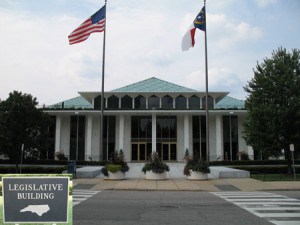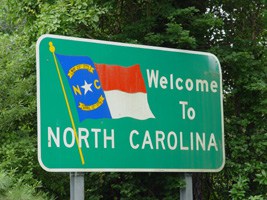 The cable and telephone industry only answers to their own interests and to those of their stockholders. So it’s no surprise they have little interest in the collateral damage that will be done across the state of North Carolina when bad bills become worse law. If it means forestalling competition, and remaining the sole provider of lackluster service to communities that need something better, so be it. In rural communities where broadband is simply not feasible to provide under existing business models, the only opportunity for ANY network to be built comes from the same principles that assured homes of electricity and telephone customers in the smallest corners of the state equitable access to service, an equity of access fund.
The cable and telephone industry only answers to their own interests and to those of their stockholders. So it’s no surprise they have little interest in the collateral damage that will be done across the state of North Carolina when bad bills become worse law. If it means forestalling competition, and remaining the sole provider of lackluster service to communities that need something better, so be it. In rural communities where broadband is simply not feasible to provide under existing business models, the only opportunity for ANY network to be built comes from the same principles that assured homes of electricity and telephone customers in the smallest corners of the state equitable access to service, an equity of access fund.
That’s why it’s now up to the citizens of North Carolina to vehemently oppose SB 1004 and HB 1252, companion bills designed to kill competition and leave smaller communities and cities from one end of the state to the other in a broadband backwater, where they’ll provide what they think is good enough for you to have, if you have it at all.
Important Questions & Answers North Carolina Needs to Consider
Why does the industry want local governments subject to the requirements of SB1004 and HB1252? So local broadband networks don’t develop. Industry spokesmen say if local governments want to enter the broadband business they must play by the same rules as the private sector. But these large companies are not subject to the rules created by SB1004. SB1004 saddles local governments – even those who want to partner with private sector companies — with unique, new rules — numerous reporting, auditing, accounting, and rate setting requirements that the industry knows will stop these deployments in their tracks.
Will the industry be subject to the “level playing field” requirements of SB1004 and HB1252? No. The industry would cease providing broadband services if they were subject to the requirements of SB1004, due to the enormous burdens it places on broadband service providers. The industry will not be subject to SB1004’s prohibition on cross-subsidies, its rate setting provisions, its annual PUC reporting, auditing or public disclosure requirements. The purpose of S1004 is to slant the competitive playing field in the industry’s direction and prevent local communities from providing their residents the broadband they need.
Is it true that SB1004 and HB1252 prevent local communities from applying for the new $4.7 Billion in Federal Broadband Stimulus Grants? Yes. Section 160A-329 (b)(3) of SB1004 prohibits municipalities who provide broadband services to the public for a fee from using any revenues to build or operate the system other than those generated by the system. This means municipalities would not be able to use any federal grant money to offset the cost of building or operating their voice, video or data systems. This is in complete contradiction to Pres. Obama’s recent Financial Stimulus (ARRA) law which makes state and local governments, not the private sector, directly eligible for billions in low cost or free capital so they can provide affordable, state-of-the art broadband services to underserved areas of our country.
Are the cable and telephone industry really interested in the welfare of taxpayers? No. The industry does not care about local taxpayers; they care about profit. The telephone and cable industries want you to believe that local broadband systems will fail, and that they do not want local taxpayers to be harmed. Local broadband systems are not failing and that is why the industry is trying to stop them. Think about it. If local broadband systems were failing, the industry has nothing to worry about. If North Carolina’s largest cable provider cared about taxpayer money, then why did it raise rates 5-50% this year in all communities except those where municipalities were providing competitive cable service? Our State’s largest communication companies have maximized their profits instead of upgrading their networks to globally competitive levels. That is why Congress has now stepped in to stimulate municipalities to deploy needed broadband infrastructure. Congress has decided that taxpayer money should be used to build this broadband infrastructure so critical to our economic competitiveness.
How do we ensure public accountability on public broadband projects without SB1004 and HB1252? Local governments are subject to numerous state and local laws requiring public accountability and scrutiny of infrastructure projects. The General Assembly established The Local Government Commission to exercise fiscal control over, and approve all, local government public enterprise projects. Local laws require local governments to hold public hearings. All public documents are subject to public disclosure (“sunshine laws”), a device actually used by the industry to obtain access to municipal financial and strategic planning decisions. Federal grants carry extensive accountability requirements. In contrast, North Carolina’s telephone and cable companies are not required to reveal their finance and marketing decisions to anyone. The industry is not accountable to the public – they are accountable to short-term profits. Local governments are accountable to the public –their decisions are driven by the need to improve the quality of life, and the environment for local businesses.
Will SB1004 and HB1252 harm public safety networks? Yes. Public Safety networks are typically regional communications networks incorporating Counties, Cities, and Towns, all who pay-in to operate the network and who receive federal grants to subsidize operational costs. Because these networks are fee-based, they would be subject to SB1004 and shut down by its restrictive rate-setting and financing requirements, where only revenues generated directly from the system could be used to operate them. Public safety systems would no longer be eligible for Homeland, ARRA or Farm Bill grants.
Questions and Answers Courtesy of Seatoa.com


 Subscribe
Subscribe



